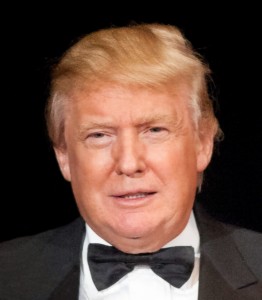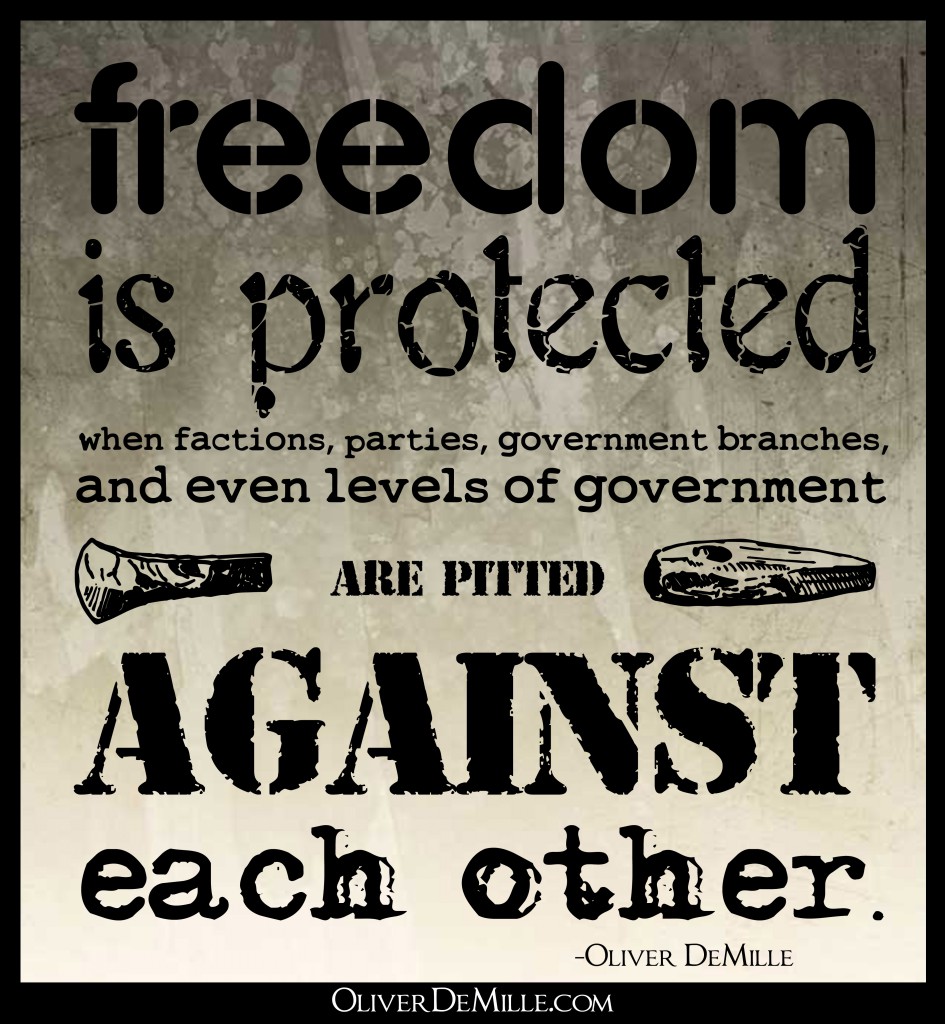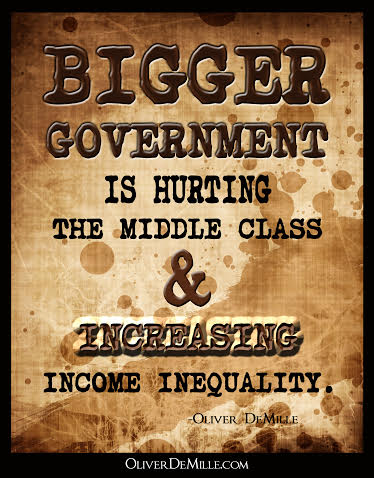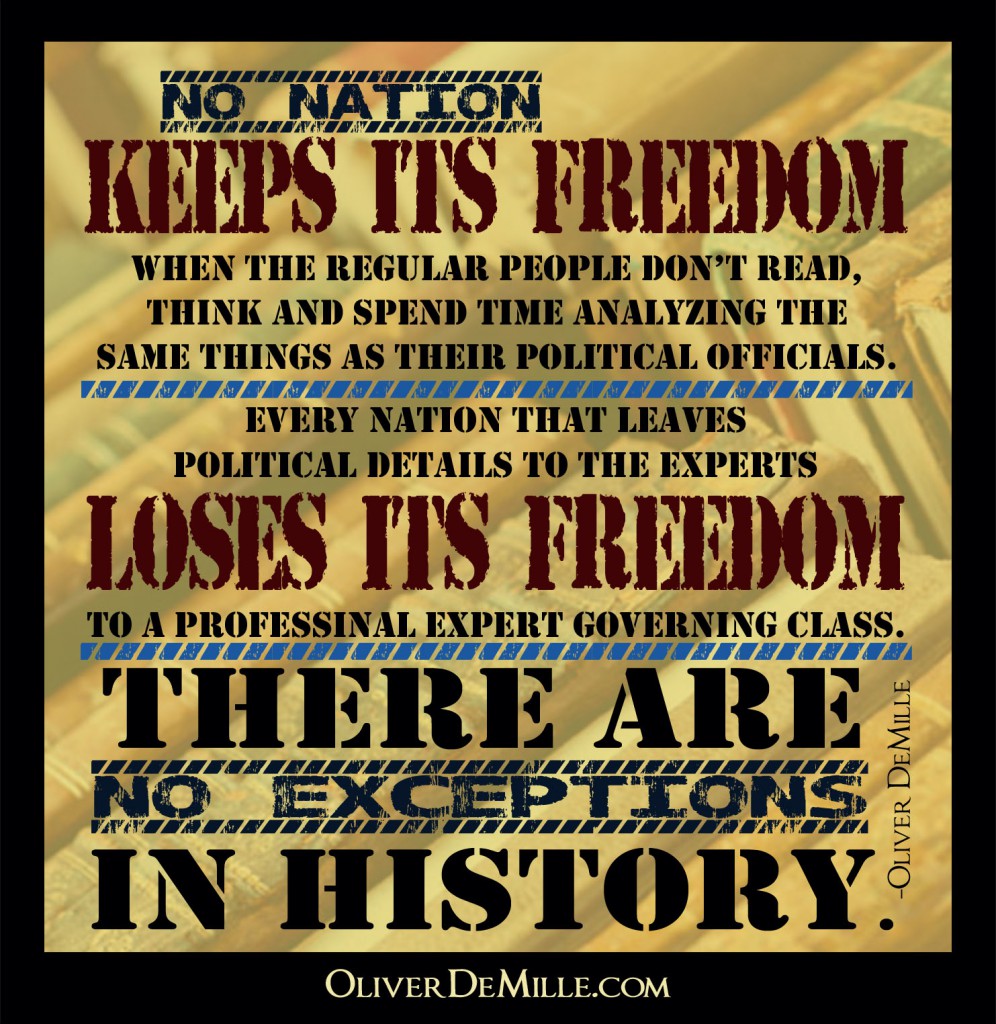Challenges with the Trump Administration?
December 27th, 2016 // 7:03 am @ Oliver DeMille
Problems in History
 I recently recommended an article from The Wall Street Journal because it addresses the fact that during the Obama Administration the executive branch greatly expanded its power. Unfortunately, the newsfeed on my iPhone gave me clear access to the article, while those following the link I provided were expected to subscribe to view the content.
I recently recommended an article from The Wall Street Journal because it addresses the fact that during the Obama Administration the executive branch greatly expanded its power. Unfortunately, the newsfeed on my iPhone gave me clear access to the article, while those following the link I provided were expected to subscribe to view the content.
My apologies for the inconvenience! I’ll address the issues directly here.
The concern is that the Trump Administration could use this expanded power in ways that continue to hurt the nation—giving more and more power to the executive branch and agencies and further reducing the powers of Congress and the States.
Since the Court has largely supported this increase of presidential and executive-branch power, the problem is growing. The article noted that presidents from both political parties have generally increased executive branch power, and that very few presidents have done anything to curtail it.
Though the article emphasized historical presidents in the early part of the twentieth century, the truth is that nearly all presidents have pushed for increased power to the White House. Clearly FDR emphasized this approach, but so did Eisenhower, Johnson, Nixon, Reagan, Clinton, both Bushes, and Obama. It is unclear whether Trump will do differently.
The American electorate should keep a very close eye on this.
Future Watch
Another challenge is that these same presidents tended to simultaneously decrease the power of the States while increasing the power of executive branch agencies, officials, and bureaucracies. The Trump Administration may or may not follow this damaging pattern.
The American citizenry needs to keep a close eye on these two very important issues in the new Administration:
- Keeping the executive branch firmly within its Constitutional limits in its dealings with Congress
- Keeping the executive branch from further degrading the powers of the States
These are vital issues, and they are currently quite perilous. The Trump Administration will hopefully take the right approach on this, but it is ultimately the responsibility of the people to ensure that freedom is maintained. Whoever you supported during the elections, these two issues are very important for the next four years–and beyond.
Category : Aristocracy &Blog &Citizenship &Constitution &Culture &Current Events &Economics &Featured &Foreign Affairs &Generations &Government &History &Independents &Leadership &Liberty &Politics
Heads up on a must-read
December 19th, 2016 // 4:19 pm @ Oliver DeMille
Category : Aristocracy &Blog &Citizenship &Constitution &Current Events &Foreign Affairs &Government &Leadership &Liberty &Politics &Statesmanship
“Attack Business, as Usual”
November 2nd, 2016 // 6:58 am @ Oliver DeMille
Washington’s Current Slump
(And the Solution)
Growing or Shrinking?
 To pay for the national debt, including the unfunded mandates and entitlements ahead, “Uncle Sam needs more than $429,108.73 per person.”[i] To figure out how this directly impacts you, just write down how much you make a year—and multiply it by the number of years you plan to keep working. (Not a perfectly precise approach, but it will get us in the ballpark.) Then multiply $429,108 by the number of people in your family. Find the difference between the two numbers, and that’s how taxes will impact you in the years ahead.
To pay for the national debt, including the unfunded mandates and entitlements ahead, “Uncle Sam needs more than $429,108.73 per person.”[i] To figure out how this directly impacts you, just write down how much you make a year—and multiply it by the number of years you plan to keep working. (Not a perfectly precise approach, but it will get us in the ballpark.) Then multiply $429,108 by the number of people in your family. Find the difference between the two numbers, and that’s how taxes will impact you in the years ahead.
For many Americans, the taxes in this reality are higher than the total amount of money they’ll make. Which is why politicians want to take most of it from the rich. But when they do, the wealthy find ways to move their businesses and savings abroad or into other financial vehicles—hurting jobs, investment, and making the economic struggles of average Americans even more difficult.
However we slice this, it’s a massive problem. It is already hurting almost all Americans (as seen in the Great Recession beginning in 2008, and growing ever since). Government stimulus, printing of inflationary money, and low gas prices have dampened how deeply we feel this problem right now—but these aren’t going to last forever. At some point the bubble will burst, and the economy is in for a tough time. All of us will be directly impacted.
But Washington hardly seems to notice. During elections most candidates promise real change, but it seldom materializes, at least not in positive ways. In fact, since 2008 we’ve seen a stubbornly sluggish economy. Washington puts out positive statistics each month, but most people aren’t feeling any kind of economic boom. And 90 days later Washington revises its past statistics—they are routinely much worse than originally announced.
Yet for some reason, the initial positive announcements make big headlines, while the revisions are usually buried in fine print. It’s almost as if the mainstream media is trying very hard to make the current Administration look as good as possible, and sway the election in their favor as well.
Safe and Secure
It may also be that Washington actually doesn’t notice how hard this economy is for most Americans. As “Phillip Longman recently noted in the Washington Monthly, the per capita income of Washington, D.C. in 1980 was 29 percent above the average for Americans as a whole; in 2013 that figure was 68 percent.”[ii] That’s 68 percent more! To put this in concrete terms, a person making $15 per hour would be compared to a person making $25 per hour. Or compare a person making $4000 per month to the 68% increase: $6720. Is it any wonder that Washington doesn’t feel the pinch quite so much as Joe American?
Compared to average Americans, Washington is doing a lot better. So why would they worry? For many in the nation’s capital, it must feel like time to fiddle, not worry that Rome is burning. Imagine how you’d be doing with 68 percent more money each month. (68% more of any amount seems fantastic. I’d be fiddling, too.)
Along with the struggling economy—largely a result of Washington’s increasing mountain of red tape that is choking American businesses—the U.S. is continuing to spend a lot of money on national security programs that aren’t working. “Since 9/11,” an investigation in The Atlantic reported, “the United States has spent $1 trillion to protect the homeland. The new security state is vast—and growing.” But “are we any safer?”[iii]
The experts answer that yes, we are a bit safer in some ways.[iv] But not even close to $1 trillion worth—and besides, we are less safe in a number of other ways.[v] Less safe, in fact, than we were when Bush won his second term or Obama was elected the first and second times. Specifically, Al-Qaeda and the Taliban are still around, Iraq is a mess, ISIS is growing, our privacy is dwindling (along with our spending power), and the threats from places like Russia, China, North Korea and Iran have actually increased, along with the growing dangers of cyber and other non-traditional attacks (chemical, biological, lone wolf, dirty bomb, etc.).
It seems the more we spend, the more vulnerable we are. Our lack of a coherent and widely-supported national grand strategy has made things significantly worse over the past decade.
As if this weren’t enough, we are also now facing a growing threat of serious economic conflict with China, which is buying up contracts and supply chains for natural resources around the world. Unlike U.S. firms that work largely on their own capital or that borrowed from banks or investors, all governed by boards and shareholders, Chinese firms are managed by a central government approach—even more controlling than British mercantilism in the 18th and 19th centuries.
Circling Closer
We’re right not to follow the Chinese model, since central controls undermine freedom. But the differences between our system and theirs skew the way economic statistics are reported, meaning that few Americans realize how bad our economic outlook really is. For example, in the latest Fortune 100 rankings of the biggest businesses in the world, the U.S. has 38 companies on the list, all of which are private.[vi] In contrast, China has 18 companies on the list; 16 of these are owned by the government.[vii] Combine the totals of these 16 businesses, and the Chinese government owns by far the biggest business in the world.[viii] Nobody else is even close.
Here’s another way to look at this: of the biggest 5 businesses in the world, one (Walmart) is a U.S. company and the next three are Chinese—all owned by the government in Beijing.[ix] The combined revenues of these three Chinese businesses are double that of Walmart, and over three times the revenue of the fifth biggest company in the world, Royal Dutch Shell oil.[x]
In comparison, Europe is home to 29 of the biggest 100 businesses in the world, 28 of which are private, while 1 is owned by the government of France.[xi] Furthermore, Japan, South Korea, Taiwan and Singapore are home to a total of 11 of the 100, and all are privately owned.[xii] Together Russia, Brazil and Mexico are home to 4 of the world’s largest 100 businesses; 1 (in Russia) is private and the other 3 are government owned (one from each of these nations on the last list).[xiii]
In short, of the world’s biggest 100 businesses and largest producers of global wealth and prosperity, 20 are owned by a government, 16 of them by one single government: China. Yet Washington keeps hobbling American entrepreneurs and investors with increasing regulations that stifle our ability to compete. Yes, China’s economy has slowed a bit this year, but their growth is still way ahead of the United States—and their slowdown will likely mean they’re less willing to keep carrying our debt load (very bad news for our economy).
It’s time for Washington to take note of our gloomy economic outlook, addiction to government overspending and growing debt, and a very expensive and bureaucratic national security apparatus that is more hat than cattle—as the saying goes in Texas. For this vitally important change to happen, we’ve got to stop expecting so much from the White House and demand a lot more from Congress. Until this occurs, we will keep declining in an “attack business, as usual” approach to the economy.
Forward or Back
All this that I have described here is a recipe for major American decline. And it is our current path.
With all that said, I’m an optimist. I believe the best years for America and the world are still ahead. But how soon we initiate those “better years” largely depends on the Congressional elections in 2016. We need a Congress that will finally stand up for the American people (against the executive and judicial branches) and get serious about creating a truly free, booming economy.
We haven’t had such a Congress for decades—and we’ve been in decline ever since that trend started. Such forces of decline are now snowballing, meaning that the actions of the next Congress will largely determine America’s trajectory for the 21st century.
[i] Harry S. Dent, Boom & Bust, July 2016
[ii] Cited in The Atlantic, September 2016, p. 102
[iii] Steven Brill, “Are We Any Safer?” The Atlantic, September 2016
[iv] Ibid.
[v] See ibid.
[vi] See Fortune, August 1, 2016, 110-119
[vii] Ibid.
[viii] Ibid.
[ix] Ibid.
[x] Ibid.
[xi] Ibid.
[xii] Ibid.
[xiii] Ibid.
Category : Aristocracy &Blog &Business &Citizenship &Community &Culture &Current Events &Economics &Entrepreneurship &Featured &Foreign Affairs &Generations &Government &History &Independents &Leadership &Liberty &Mission &Politics &Producers &Prosperity &Statesmanship &Technology
THE REAL BATTLE OF OUR TIMES
October 26th, 2016 // 6:40 am @ Oliver DeMille
And the Real Need in the 2016 Election
Vital Point #1
 We need a Congress that will finally stand up for the American people and get serious about adopting policies that bring a more genuinely free—and therefore booming—economy.
We need a Congress that will finally stand up for the American people and get serious about adopting policies that bring a more genuinely free—and therefore booming—economy.
While the mainstream media focuses on the presidential election, the real battle will be for Congress. Even some members of Congress argue that winning the White House for their party will make all the difference—but that’s only true if the next Congress remains weakly afraid to take on the Oval Office and use the power of the purse to put our economy back on track. The American framers set up the Constitution with exactly this in mind: a strong Congress that keeps the president in check.
Many people consider this election one of the most important of our generation. And it is, but not because of the presidential contest. Put simply:
Regardless of who wins the White House this year, the real issue will be whether we have a weak Congress who lets the executive branch keep increasing spending and decreasing freedoms—or a strong Congress that understands what the Framers intended and uses their Constitutional powers to get our economy back to true free enterprise.
 No matter who becomes president, this one issue will determine our future.
No matter who becomes president, this one issue will determine our future.
The voters need to understand this, and keep their eye on the ball. This is extremely important.
The two things the next president will do that are near this level of importance are 1) to appoint new members of the Supreme Court, and, 2) heaven forbid, to deal with a major national security problem. So, obviously, the executive election matters as well. But without the right Congress, we’re in for major decline in the coming years—no matter who occupies the Oval Office.
Vital Point #2
The real battle isn’t what most people think. It is being waged in both subtle and open ways, but academia and media seldom mention it directly. Yet this battle will determine our future.
Many think the great battle of our times is one of the following:
- Socialism vs. Capitalism
- International Interventionism vs. America First
- China vs. the United States
- Conservatives vs. Liberals
- Globalism vs. Nationalism
None of these is even close to our biggest challenge. Today’s great war for our future is much larger, significantly deeper, and more impactful than any of these. The great battle of our times is:
Elitism vs. Enterprise
More specifically: Top-Down Elitism vs. Grassroots Free Enterprise. Note that elitism thrives when a few super-rich at the top dominate finance, politics, media, and culture in our society. Enterprise flourishes where the regular people—the masses—have great economic opportunity and as a group determine our economy, government, and social customs/values.
 Elitism rules from a few top banks, governmental institutions, exclusive universities, elite media firms, and dominant corporations. Enterprise drives society from the basis of strong families, communities, churches, voluntary service organizations, and small businesses.
Elitism rules from a few top banks, governmental institutions, exclusive universities, elite media firms, and dominant corporations. Enterprise drives society from the basis of strong families, communities, churches, voluntary service organizations, and small businesses.
But there’s more: Elitism today dominates the top organizations promoting both socialism and capitalism, and it makes up the Establishment of both major political parties. Elitist banks and corporate leaders control the management of those seeking both globalism and national strength. The leading media and academic hawks and doves are nearly all elitists. Elites win by controlling both sides of things—wherever they can.
Elitist investment rules the corporate world, top media providers, and the most powerful special interest groups. Elitist philanthropy controls higher education, the most influential think tanks, and many of the most powerful foundations (most of which operate quietly behind the scenes).
In America, the word Enterprise is frequently coupled with its partner, freedom, in the phrase “Free Enterprise”; but “Free Elitism” is an oxymoron. If it’s truly free, it isn’t elitist.
Indeed, it is elitist influence in Congress and the media that circumvents the Constitution by convincing the House not to utilize its power of the purse to check the White House, the Court, or the Senate. So, yes, the real need in this election is to elect the right Congress—men and women who will use the Constitution as intended.
Action Plan
But the real war runs much deeper: Getting regular people to choose enterprise over elitism, in their votes for Congress and in their everyday education, career and cultural choices as well. This war—to awaken the people to the reality of top-down ruling elitism vs. grassroots free enterprise, and get them to take a stand for free enterprise—is the great battle of our times.
This starts with the most basic principles of learning and livelihood. On an educational level: If you’re not regularly reading the great books, great classics, and great ideas, you’re part of the problem. Concerning career: If you’re not engaging or strongly supporting entrepreneurial ventures, or (at the very barest minimum), encouraging entrepreneurialism among the youth, you’re part of the problem.
 If you’re swayed by the education/career conveyor belt, or pushing your children and grandchildren into it, you’re part of the problem. If you’re swayed by the elitist Establishment that dominates both political parties, or their media partners, you’re part of the problem. And if you’re caught in the socialist vs. capitalist or national versus globalist debates (all of which are ultimately led by elitists), you’re part of the problem.
If you’re swayed by the education/career conveyor belt, or pushing your children and grandchildren into it, you’re part of the problem. If you’re swayed by the elitist Establishment that dominates both political parties, or their media partners, you’re part of the problem. And if you’re caught in the socialist vs. capitalist or national versus globalist debates (all of which are ultimately led by elitists), you’re part of the problem.
Elitism wins as long as the masses play the elitist’s game. Indeed, many people are actually supporting elitism, either by giving up on their dreams and simply settling for whatever job pays the bills, or by trying to climb the elite ladder and become part of the elite themselves (and/or guiding their children toward the same).
The solution is enterprise. What is your mini-factory, your enterprising project (or projects) that fuels your passion and have the potential to greatly improve the world? If you don’t have such a mini-factory—or find yourself seldom working on it—you aren’t fighting the great battle of our time. And our side is losing.
This battle is real. Current. Dramatic.
It is happening right now.
We need to win it for freedom, for our children and grandchildren, for the future of families and morality and goodness. Which means this: We need your involvement.
Right now.
(To learn more about creating your own personal mini-factory, and how this will win the battle of our times, read The Coming Aristocracy by Oliver DeMille. Available at the Leadership Education Store)
Category : Aristocracy &Blog &Business &Citizenship &Community &Constitution &Culture &Current Events &Economics &Education &Entrepreneurship &Family &Featured &Foreign Affairs &Generations &Government &History &Leadership &Liberty &Mini-Factories &Mission &Politics &Producers &Statesmanship
Are We Entering an Era of One-Term Presidents?
July 22nd, 2016 // 2:49 am @ Oliver DeMille
Loyalties and Addictions
 Many nations, and the global market as a whole, are moving from the Loyal Economy to an On-Demand Economy. (See Klaus Schwab, The Fourth Industrial Revolution, 2016, 72) This is just what it sounds like. Our societal focus is increasingly on what we want–not what we need, should want, or have already agreed to.
Many nations, and the global market as a whole, are moving from the Loyal Economy to an On-Demand Economy. (See Klaus Schwab, The Fourth Industrial Revolution, 2016, 72) This is just what it sounds like. Our societal focus is increasingly on what we want–not what we need, should want, or have already agreed to.
This shift is impacting work, business, management, leadership, professions, and even families, churches and communities in massive ways. It has already taken a significant toll on relationships in our modern society. Indeed, almost no part of human life has remained untouched by this momentous change.
Just think of all the ways damage can be caused by a shift away from loyalty, and changed to whatever someone wants instead, and you’ve got a pretty good indication of the problem. For example, as a society we have historically been known for being loyal customers—we either love or hate the Yankees, Cowboys, Lakers, etc., and many people have traditionally been very passionate about Ford or Chevy, West Coast or East Coast, City or Farm, New York Times or Wall Street Journal, Prada or Gucci, and so on.
As for Republican and Democrat, these attachments were often multi-generational, and as zealously maintained as one’s religion. For a number of people, these labels (GOP or Democrat) defined “who they really were as people” more than any other feature.
But in the Digital Age we’re losing many of these connections. A lot of people now switch allegiance to sports team based on how the best clubs are playing this season, and we change “favorite” recording artists or television shows almost as often as we change our socks nowadays. We press “Like” one day, and don’t press it the next. Just follow the Twittersphere—changing loyalties is new a national hobby. Or addiction.
The Line
With the endless options of the Internet constantly streaming in front of us, it’s not surprising that many customers—most customers in fact—consistently try out new options. Why not? Maybe the next one will be better.
The same is true of many companies. It used to be that good employees were given numbered pins each year or decade—to show how long they’d been at the company. The ideal was once to work your whole life with one organization, move up the ranks a little or a lot, and retire in the same company and town where you started your first job. The whole company threw a party, and you were presented with a gold watch, an engraved silver pen, or another memento of your long-term loyalty.
Today few companies exhibit such loyalty. Some, in fact, routinely purge upper-level management in order to replace more expensive employees with cheaper, younger models who are decades from earning a pension. The laws have made it much easier to carry your retirement savings with you from company to company, and a lot of people are constantly on the lookout for a better job elsewhere. There are popular apps dedicated to this habit.
Given today’s technology, and the nimbleness big organizations must somehow try to exhibit in order to remain relevant, such changes aren’t surprising. In fact, they may simply be the new way of things, the new normal. The old is always being replaced with the new. This week. In fact, in the news cycle Monday’s “crises” and “tragedies” often go unmentioned by Thursday.
Thus it isn’t shocking that our political leanings are going through an era of upheaval as well. During modern periods of economic and cultural stability, a majority of voters stick with the parties. Whether you like this approach or not, it’s usually the reality. Such majorities may be “silent” most of the time, but on election day they vote like the experts knew they would. They toe the party line.
Parties or Menus
We have seen this kind of stability erode a great deal since 2006. The iconic memory of 9/11, followed by the failure to find weapons of mass destruction in Iraq or win the wars in Iraq or Afghanistan easily and quickly, threw the electorate for a loop, and the Great Recession that followed moved us decisively away from political stability—at least for a while. China, Russia, the Middle East, North Korea, fluctuating prices, an economy that never seems to recover, and so many other things contribute to a growing sense of chaos, and of things getting worse.
Indeed, elections seem to get crazier and crazier. Predictions by the top experts, and the masses of talking heads, are now routinely wrong.
This isn’t driven by a cycle, however, meaning that we can’t chalk it all up to “a phase” the nation is going through before it reverts back to its traditional, normal behaviors. Cycles and trends do sometimes explain things that happen, but this time something more is going on. The rise of nearly-ubiquitious digital mobility is still in its infancy, and it is quickly restructuring politics (along with marriage, family, community, education, career, business, the economy, etc.).
Voters are less and less likely to be Loyalty Voters, emotionally attached to one party that stands for their culture, their beliefs, their family traditions. Indeed, in a world where more and more people are routinely questioning their birth culture and family traditions, they’re not likely to let loyalties based on these things get in the way of change.
Specifically, we are entering a Pragmatic Era in politics, where people want on-demand government. They want a menu of options to choose from, not a political party and its bureaucracy. They don’t really want to choose between candidates. They want a little of what one candidate has, but without the rest of his ideas. They want some of what another candidate promotes, minus his personal views, or his stand on [fill in the blank…]. They like what they hear from one candidate on one day, but disagree with what she says the next.
Response Government
It’s not so much a targeted electorate where the candidates try to win over the biggest special interests—like it has been for the past two decades. What’s emerging now is, to repeat, a growing clamor for on-demand politics. Voters want to unbundle government. They want to be able to select “yes” items and “no” items from every candidate running for high office.
In other words, they want Washington to live in the Digital Age. They want to directly email—or, better still, text—presidential candidates and have an on-going dialogue with them, and then continue the dialogue after the president is elected.
“I liked your speech yesterday at Georgetown, except for the part on naval upgrading. What actually needs to happen is…”
Moreover, they want the President to answer their email.
“Thanks, Amy. I see your point. I’m meeting with the Joint Chiefs later today and I’m going to tell them your recommendation—and order them to do it. They really need it. Good thing you’re on our side and sent me that email.”
Today’s voters want the government to respond the way Amazon does. Immediately. In fact, they want to be able to sign up for the President’s Prime service—free answers within the hour, and nearly-immediate government implementation of whatever you tell the Oval Office to do.
“Get your policy implemented by Tuesday at 8 p.m., if you order it in the next 8 hours and 41 minutes. To get it by Monday at 8 p.m., pay an extra $3.99 and click here…”
As a result of this shift in voter expectations from their government (and the fact that government is still stuck in the 60s–or maybe the 70s–ways of doing things), hardly anyone is truly happy with any election anymore. Presidents Bush and Obama may well be the last loyalty-backed presidents. Indeed, barring a major military threat that unites the nation against a common enemy and brings back a loyalistic approach, most future presidents may well be one-termers.
That’s worth repeating. We may be entering an epoch of one-term presidencies. We’ve already seen the voters moving this way with their seeming schizophrenia in presidential versus Congressional elections. They routinely put one party’s candidate in the White House and simultaneously fill the Congress with the opposing party.
Solutions
Again, what the voters really want is a truly on-demand system, where they can elect national leaders and direct their actions issue by issue, “no” on this, “yes” on that—preferably with a click of their computer—er, smartphone. This is leading in the direction of more democracy, specifically a more democratic system built around online voting. And, honestly, most modern Americans see this idea as excellent, obvious, and overdue.
In response, I have two words:
- Federalist.
- Papers.
If you have studied them in depth, you know exactly what I mean.
But most people haven’t.
And that means we’re in for a wild political ride just ahead. It might contain a series of one-termer presidents (the nation swinging pendulum-like to and fro, then back again, over and over), a serious party shakeup with a new dominant national political party (or two), or it might be something even more surprising.
Whatever is coming, there is a widespread sense that it’s big. And we don’t even have Steve Jobs to walk out on a black stage in his black t-shirt and announce the future. If he were still around, he’d tell us to hold on to our hats, because this flight into the Era of populism, globalism, voter pragmatism, and digital-age on-demand revolution is just beginning. And the only thing we know for sure is that it’s going to get bumpy.
(Solution: It’s more important than ever for regular people to deeply study the core principles of freedom! The politicians and “experts” aren’t going to fix this for us—they’re the ones piloting the current chaos. For a beginning reading list of core freedom principles—and audios to go with each— join Black Belt in Freedom)
Category : Aristocracy &Blog &Citizenship &Community &Constitution &Culture &Current Events &Education &Featured &Foreign Affairs &Generations &Government &History &Independents &Information Age &Leadership &Liberty &Mission &Politics &Producers &Statesmanship &Technology












